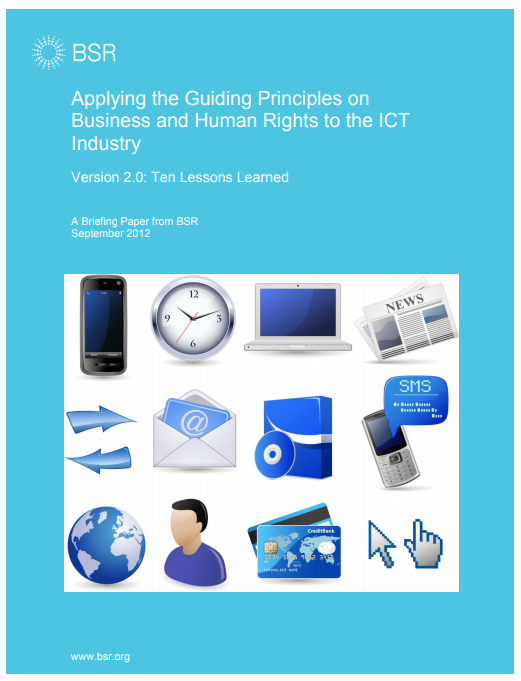In June 2011, the United Nations Human Rights Council approved new Guiding Principles on Business and Human Rights, which are a basic expectation for all businesses of all sizes in all industries. Since then, one of the key human rights questions faced by companies is this: “How should companies apply the Guiding Principles to business strategy and operations?”
This briefing paper provides insight for information and communications technology (ICT) companies on how to apply the aforementioned Guiding Principles, together with the ten lessons learnt from the first version of the briefing in 2011:
- The speed of innovation in the ICT industry presents a daunting practical
challenge for human rights impact assessments (HRIAs). We have found it
helpful to think in terms of categories of product, rather than individual
products, which can change even during the course of an assessment.
- Convergence, mergers, and acquisitions can significantly alter the human
rights risk profile of individual companies. It is important to reassess a
company’s human rights risk profile following a significant event.
- A tree structure (i.e. that branches out to other issue-specific policies) works
well for human rights policies in the ICT industry.
- HRIAs at the level of the product, service, or technology can be especially
important for ICT companies.
- Stakeholders can significantly contribute to helping identify human rights
risks, but many (though not all) ICT companies consistently undervalue them.
- Outside corporate HQ, such as at the country or business unit level, the
standard of human rights expertise in a company can be very low. Training
and guidance is required to embed human rights due diligence throughout a
company.
- ICT companies often find themselves in positions with limited room for
maneuvering on human rights; they need to think creatively about their use of
leverage.
- Dialogue and discussion with key departments, executives, and managers
about potential human rights scenarios are effective methods for integrating
human rights into company operations—and must be used alongside
refreshed management systems and processes.
- With some notable exceptions, ICT companies rarely report sufficient
information on human rights, or produce low-quality reports. Innovation in
reporting is a significant priority.
- Transparency around human rights means both reporting to the public and
communicating with users.
Companies seeking to apply the Guiding Principles are advised to build these
lessons into their human rights programs and strategies.

